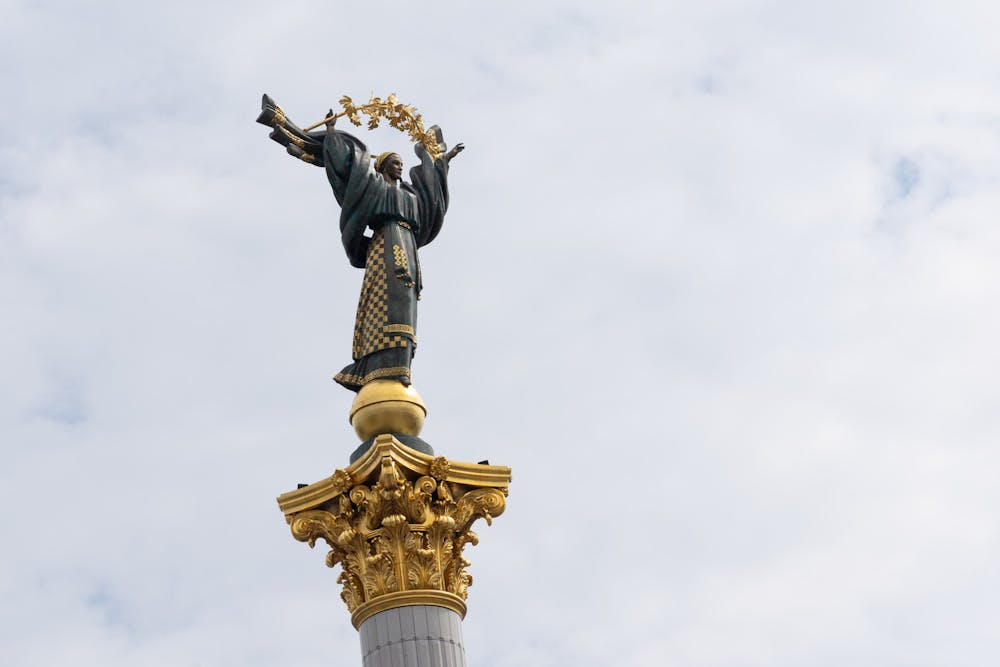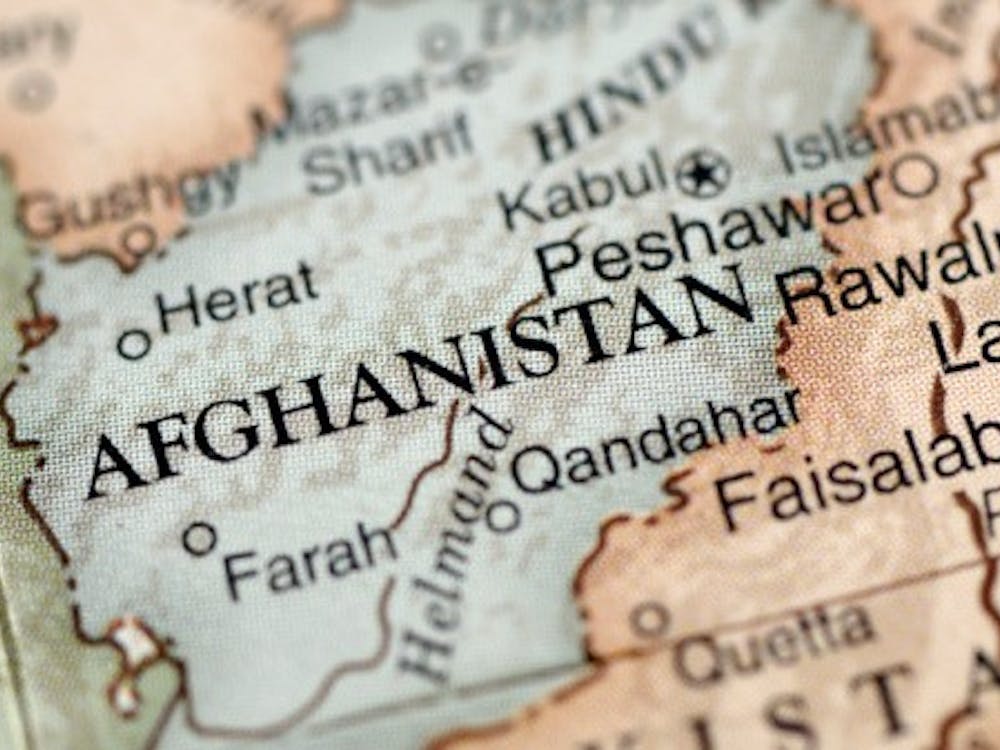The views and opinions expressed in this discussion are those of the speakers alone. This conversation was recorded on March 15, and as the conflict develops, some points may not be current.
Austin Thompson
Hello everyone. My name is Austin Thompson, reporter for the Beacon, and today we're going to be talking about the current situation in Ukraine. February 24 saw the Russians launch a full scale invasion into Ukraine, in a major escalation of the conflict since it began in 2014. With the situation developing by the hour, it can be difficult to truly follow the events as they unfold. So, here to help us better understand this very confusing and tragic situation. I am joined by Dr. Meiser of the political science department. Dr. Meiser, thank you for being here.
Jeffrey Meiser
It’s my pleasure.
Thompson
Thank you, if you wouldn't mind just by briefly introducing yourself. Tell us about your position here, your background and any other information you think might be important to the conversation.
Meiser
Yeah, thanks for having me. And as you said I'm Dr. Meiser in political science, which is true. I specialize in American foreign policy or national security issues. Before coming to Portland, I taught at the National Defense University in Washington DC, which is the Department of Defense’s war college. So that's sort of my background. And so I follow a lot of international security issues and events. And I'm here to, yeah, answer some questions.
Thompson
Alright, fantastic. Thank you for being here. So well, let's get right into it. Let’s start with the first question; if you wouldn't mind giving us a brief explanation regarding the history of conflict in Ukraine since 2014. Specifically, if you could cover how the conflict has evolved into a full scale invasion from Russia.
Meiser
Yeah, there's a lot going on there. I guess we could start with basically the end of 2013, where the then president of Ukraine was trying to shift Ukraine to be sort of more aligned with Russia. A lot of the people in Ukraine didn't really like that idea, especially the western part of Ukraine. So between about November 2013 and early 2014, a lot of protests happened in the main city of Kyiv in Ukraine. That led to the ouster of the pro Russian president and the election of a pro-European pro-Western president soon after that.
And then, we have that followed by the secession of Crimea and annexation of Crimea by Russia. Crimea is a southern province of Ukraine. And so this session was orchestrated by Russian secret services, and it was probably supported by a lot of the people in that area. A lot of people in eastern Ukraine and southeastern Ukraine are Russian speaking, they're considered ethnic Russians. So there's a good amount of pro-Russian sentiment there. So that was followed in the spring of 2014 with a separatists conflict in eastern Ukraine or what's called the Donbass region. And so, several sort of separatist factions emerge, they are again supported and sometimes led by Russian forces, and started basically a civil war in Ukraine. And after months of fighting, that sort of stabilized and so there's been ongoing, ongoing conflict in eastern Ukraine since then, up until present day.
And that's as Austin was saying, that's followed by the full on invasion of Ukraine by Russia in February, late February of this year, and that was basically driven by Vladimir Putin, the leader of Russia by his desire to bring Ukraine under the control of Russia at least, at least making Ukraine neutral if not fully aligned with Russia. And so, some argue that it was driven by fears of NATO expansion. You know, NATO is the Western alliance, the US led Alliance in Europe, that Ukraine will become part of, of NATO and part of the European Union. And, and for me, that's not it's not totally accurate to say that's the reason because I feel like Putin would not ever be happy with a free and independent Ukraine regardless of whether it joins NATO or not. So I think it seems from Putin’s perspective, he saw an opportunity to kind of bring Ukraine to heal and that was sort of the trigger for that invasion.
Thompson
Perfect so we could focus a bit more on the Russians. So what is the perspective from like the average Russian soldier and what is the Russian public being told about the invasion and the justification for the invasion?
Meiser
Yeah, you know, not much I mean, most of the media in Russia is controlled by the state there isn't really a free press there. So information is a bit hard to come by, of course, up until recently, they could access, you know, social media from the west and so on, but there’s really not much information being shared with the Russian people. I think that they do know that war is happening, but Putin called it a, you know, a special security operation. He hasn't called it a full invasion. So I think that the scale of it is not really known by the Russian people.
Thompson
So let’s talk about the actual invasion of Ukraine. What happened in the initial invasion, with the build up, the actual invasion on February 24, and why has progress stalled since then?
Meiser
Yeah. So there's been a months-long buildup of forces on the Ukrainian border, the border between Russia and Ukraine. Also, Russia stationed troops in Belarus, which is sort of to the West of Russia and North of Ukraine. So the forces were built up for a long time and then it was several weeks ago as early as February where the United States came out and said, and President Joe Biden said “hey, this invasion is happening. Russia says it's an exercise, it's not, Russia is definitely, definitely going to invade”. So I think up until the actual invasion, the President of Russia or the president of Ukraine, Zelensky, was saying that invasion is not going to happen. So there was a bit of confusion there. And then, I think the invasion happened and the initial goal of Putin was a quick overthrow of the Zelensky regime.
And so the first operations were some for paratroopers being sent in to kind of take an airport and hold it and bring in follow-on forces by helicopter or plane to basically just depose the Ukrainian government and with the hope that the force would collapse at that point. Essentially, the opposite happened, the early Russian assault was destroyed by Ukrainian forces, with huge casualties by the Russians. The following forces by Russia, it’s been very difficult for them to move especially through the north eastern part of Ukraine towards Kyiv that's been stymied by Ukrainian resistance using anti tank weapons and anti aircraft weapons provided mainly by Western countries, NATO countries. So it's really just really slowed down that assault.
Also, Russia is shown to be pretty bad at war, surprisingly bad at war. Leading into this invasion, people kind of were building up the Russian military as being, you know, it's modernized and can kick some ass. You know, but they had major logistics problems, major morale problems, they couldn't just do some of the basic tasks of warfighting, which surprised a lot of people. I think in the south, you know, we had Russian forces also coming out from Crimea in the south. That was much more successful. I think the terrain is more open there, less built up and also a lot of the key, the best units of the Ukrainian Armed Forces are around Kyiv, so they were kind of depriving some of the forces, the Ukrainian forces, in the south of the equipment and forces they needed to really put up a good fight against Russia. So that explains the initial Russian success there. They besieged a couple of studies, Mariupol, for example, I think is the one that's best known and they're showing a lot of footage of that on the news and so on. But even there, you know, the Russian advance is now stalled. And so for several days now, the report has been well, no major advances by Russian forces.
Thompson
So I see a lot of news reports talking about the Russians as kind of being held back in the conflict in regards to their military power and the equipment they can unleash, and that Russia is kind of a sledgehammer typically when it comes to conflict. But in this conflict, they can't exactly do that because of all the attention and possible civilian casualties. Would you agree with that?
Meiser
I mean, to some extent, I mean, there is, you know, war crimes that have occurred, that is the specific targeting of civilians, it seems like that has occurred, but of course, it could be worse. If we look at the Russian operations in Syria, for example, over the previous several years, really just destroying whole cities in Syria. So it could be much worse for Ukraine, and hopefully it doesn't get to that point, but it could be much worse. I think that's true. But also it seems like I mean, some people are already some military analysts are arguing that well, this isn't the type of conflict Russian forces trained for and that if they were in a high intensity, you know, combat situation with NATO, for example, they'd be doing better. Other people are saying, well, that's laughable because, you know, their trucks are getting flat tires, like they haven't maintained their equipment. They just can't support their troops. So they would get you know, beat it up pretty bad by NATO. The second position, I think I hold that a little more, it just seems like they're not good at the basic tasks of war fighting. So I think they're, they're being held back by their own incompetence, to a large extent. But yeah, they definitely could be way more indiscriminate in their bombing. For example, and that still could happen.
Thompson
Okay. Speaking of logistics and logistical problems for the Russian military, there's been talk about -I forget exactly how long it was-, I think it was a 17 or 27 kilometer long convoy that’s been moving in or towards Ukraine, do you think that's gonna turn the tide of the conflict at all?
Meiser
(Laughing) I laugh because it's like this so-called 40 Kilometer convoy that looked very foreboding at first like oh my god, they’re bringing in all this stuff, but it just stopped like it never made it. It still hasn't made it. The thing is, a lot of like, you look at like a main battle tank today like it's like one mile per gallon of gas. It's not that bad but it's just an insane amount of gas or fuel to get a tank from the border of Russia, you know, Ukraine border, to Kyiv and you have to have the ability to resupply and to fuel those vehicles. So I mean, this seems like this long convoy just kind of, you know, ate itself up like it didn't have enough fuel and supplies to actually make it. And now there's reports that Russia is asking China for food to feed its soldiers, like the prepackaged meals the soldiers usually eat they’re usually MREs or Meals Ready to Eat. Like they're asking China for that. So it's like they can't even produce the food to feed the soldiers. It's really kind of a bizarre situation, honestly. But it seems like that convoy is not going to do anything.
Thompson
Yeah. There's also talk about supplies and fuel. Russia's been slapped with immense sanctions. Do you think that's gonna have a major effect on the way they conduct this war or how much longer they can conduct this conflict?
Meiser
I think over time that those sanctions will play a larger and larger role to kind of loom larger as, like existing supplies, it's hard to replenish or it's hard to bring in additional supplies or to manufacture things like that. I think it will increasingly have an effect. I don't know operationally what that will look like. But I think in terms of just putting pressure on Russia overall it will matter a lot. I think that it seems like Russia's sort of defense industrial base is kind of maybe weaker than it was also assumed because Russia supplies a lot of weapons to countries around the world like say India, for example. And this is one reason why some countries aren't really, you know, lining up against Russia as much as they otherwise might and that they kind of still want to be supplied with Russian weapons in the future. But it seems like Russia can't even supply its own forces. I think those countries also kind of think twice. Oh, wow. I guess they don't have the capacity to even supply their own. So how are they gonna supply us? I think that's gonna play a bigger role as well. Moving forward.
Thompson
Yeah. Oh, I guess like speaking of other countries, if you want to wrap it up a little bit here. What's the outlook for the future of the world? For Russia? For Ukraine? What can the world expect to see in regards to the fallout of the current situation?
Meiser
Outlook is terrible for everyone. Just kidding, it is mostly terrible for Russia and for Ukrainians. I think that what so I think that there was a lot of surprises along this as this crisis and then war has developed and a lot of downsides for Russia. I think, and some upsides, I think for Europe and the West in the sense of the conflict is seem to reshape, you know, security relations and sort of threat perception in Europe so that, you know, NATO and Europe is really united more so than they have been in a really long time. And we have sort of like mini revolutions in terms of the ways of thinking of some European governments, especially in Germany. Leading up to the war Germany was, you know, criticized a lot for not really doing much to help Ukraine. They were sort of made fun of on social media for sending your 5000 helmets when Ukraine is like “send us weapons, we need weapons” and Germany’s like “oh, here's some helmets”. But now Germany has decided to increase its defense budget by 50% to supply weapons to Ukraine. So doing all this, all this stuff, and so I think the alignment in Europe looks really negative for Russia.
I think that China is a little bit in a difficult position in that it was kind of growing closer to Russia as we approached this conflict. Seems like China was maybe informed that something was going to happen, but I think they were surprised at the level of violence that's occurred. And so they're kind of stuck now. Are they going to help Russia out more or are they going to help isolate Russia? China still depends a lot on the West and those relationships, so China’s kind of stuck. And so I think this will be an important moment for them to kind of share whether or not they're going to kind of go along with the Western order more or less and maintain those relationships or whether they're going to go fully behind Russia or not. So I think that's something definitely to watch.
I think also, you know, escalation is a big issue here and some people are really worried about potential nuclear war. As Putin has suggested, sort of hinted at and maybe resorting to nuclear weapons if NATO intervenes in this conflict more directly. And we do have NATO countries supplying a lot of weapons to Ukraine, possibly the most controversial issue right now is to supply fighter jets to Ukraine. And so it seems like the West wants to supply more weapons and better weapons and do more to support Ukraine. And that Russia, you know, Russia, if it still keeps going poorly for Russia, they're going to view that as more and more of a threat. They just, I think it was yesterday, you know, hit a Ukrainian base in western Ukraine that was seen as an outpost for receiving Western aid, and even Western military volunteers that was hit by some cruise missiles. So you know, that's pretty close to the Polish border, which of course got people's attention. So there's certainly room for escalation here. And even maybe NATO forces engaging Russian forces. I think most people are not wanting to see that happen. But that's a possibility. So there's a lot of potentially negative outcomes on the horizon. Of course, the hope is for some sort of diplomatic agreement that will end the fighting. First a ceasefire, and there's some kind of agreement that sees Russia removing its troops from Ukraine and peaceful relationships kind of coming about. I don’t see that happening in the very near future, but hopefully, in the next weeks, rather than months, I hope to have an agreement.
Thompson
Yeah, absolutely. Well, those are the questions I have. If there's anything you want to add before we end here, by all means, please do.
Meiser
I think I'm good. Thank you.
Thompson
Great, good. Well thank you for coming. I really appreciate it. And yeah, thank you very much.
Meiser
Hey, thanks.
Transcribed by https://otter.ai
Austin Thompson is a reporter for The Beacon. He can be reached at thompsau22@up.edu.








